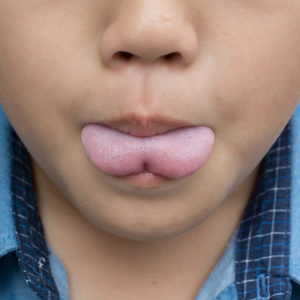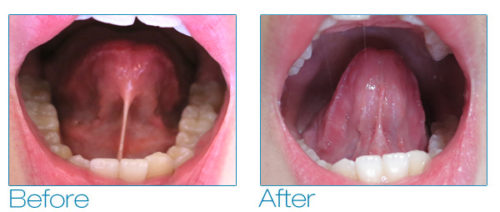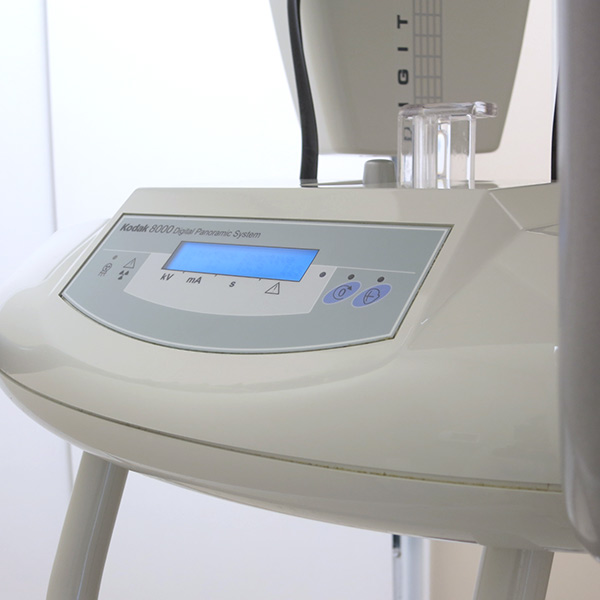
Ankyloglossia, also known as tongue-tie, is a congenital oral condition that may decrease mobility of the tongue tip and is caused by an unusually short, thick lingual frenulum (the membrane connecting the underside of the tongue to the floor of the mouth.) Tongue-tie varies in degree of severity from mild cases, to complete ankyloglossia whereby the tongue is tethered to the floor of the mouth. Tongue-tie can affect eating, speech, and oral hygiene.

Frenectomies can be safely and efficiently completed with a soft tissue laser with predictable tissue response and minimal bleeding during and after the procedure. Laser oral surgery also features less wound contraction and reduced scarring and bleeding and almost no chance of post treatment infection when compared with scalpel incisions.





I believe my boyfriend has a tongue tie and was curious if you do consults/procedures on adults ? I work in a speech clinic and feel he presents with quite an embedded frenulum.
Hi Alex, we do tongue tie release procedures on adults. Please contact us at [email protected] or 905-707-8008 to book for an initial exam. We look forward to meeting you!
Hi just wondering how much approximately is the tounge tie treatment in adults
Thanks
Hi Dion, thank you for contacting us. Our Office Manager will email you directly with a quote during our regular business hours. We’d love to see you for an exam to see if the treatment is the right one for you!
Hello.
I was eating a bit down too hard on what I was eating and my tongue tie detached. It bleed for a bit then stop. It feel a little numb when I use my tongue to touch the area that was attached to my gum. Is this something I should worry about?
Hi Terry-Ann, unfortunately, without a physical examination I cannot comment on your particular situation. Please see a dentist for assessment if possible.
In general, if a small portion of frenulum is torn slightly, and bleeding stopped almost right away, the area will tend to heal on its own. The best course of action in that case would be to rinse with salt water a few times a day to help with healing, and to avoid eating anything crusty, acidic or spicy for at least a few days to avoid causing further irritation.
Hi, I and my husband, both, have a tongue-tie. It was always affecting us negatively. We just found out that your clinic has the procedure to cut it. Could you, please, let us know how is it done, and how much it cost. BTW, we both are seniors.
We would prefer Thornhill location.
Thank you.
Meri
Hi Meri, we recommend booking a consultation appointment to go over your and your husband’s medical and dental conditions and assess the severity of tongue tie so that we can give you a realistic idea of the degree of release that can be expected. During the procedure, the tissue to be released will be numbed with local anesthesia and a soft tissue laser will be used to release the ligament responsible for the tongue tie. You will be sent home with some tongue stretch exercises to prevent ligament reattachment. We will see you the week after for a complimentary re-assessment.
Our receptionist will reach out to you with the pricing for the consultation exam and tongue tie release procedure during business hours. We look forward to meeting you!
Hi,
I have a slight lisp and jaw pain. Would this procedure help with that? Is it covered by health insurance? What is healing like?
Thank you!
Hi Amanda, it is hard to tell if the tongue tie is the reason for your lisp. For our adult patients who have some form of speech impediment, we usually recommend a consultation and some work with a speech therapist at the same time. The tongue tie procedure is covered by some private dental insurance plans here in Ontario. The healing time varies from person to person and tongue stretching exercises are necessary to prevent reattachment during healing.
Does insurance cover the surgery for the tongue tie removal ?
Hi Ashley, some dental insurance covers the tongue tie release procedure. You will need to contact your insurance company to find out.
Is tongue tie release covered by ohip?
Hi there, unfortunately, tongue tie release is not covered by OHIP. The only exception is for newborns who are assessed and treated in the hospital.